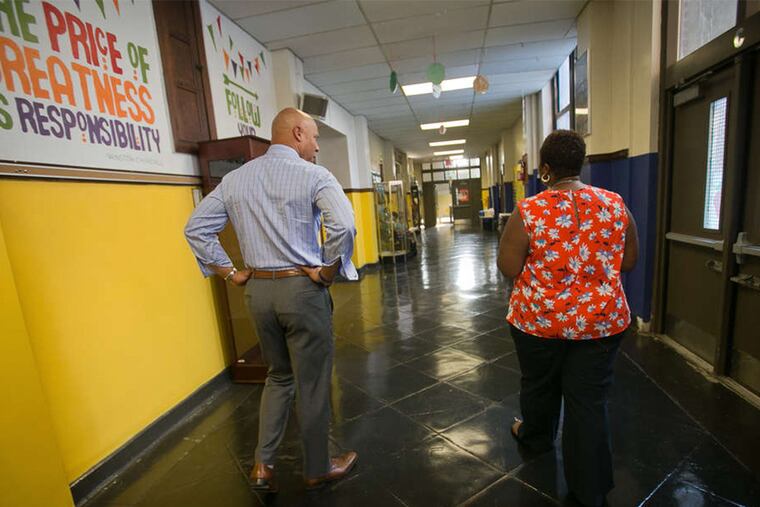Wrong lesson plan
The School Reform Commission's botched premier of its effort to save money by privatizing the assignment of substitute teachers is another consequence of the state legislature's failure to adequately fund public education. Confusion created by the miscue provided a lesson in how to disrespect the Philadelphia schoolchildren who suffered as a result.

The School Reform Commission's botched premier of its effort to save money by privatizing the assignment of substitute teachers is another consequence of the state legislature's failure to adequately fund public education. Confusion created by the miscue provided a lesson in how to disrespect the Philadelphia schoolchildren who suffered as a result.
Imagine the blow to children's self-esteem when the adults don't seem to care enough about your education to get it right; when the adults argue over and over about how much they have spent on your schools while failing to acknowledge they haven't spent enough. As another school year began last week in Philadelphia, some students unexpectedly became the latest case studies for a course in public education economics.
In a cost-cutting move, the SRC entered into a two-year, $34 million contract with Cherry Hill-based Source4Teachers to provide substitute teachers in the district. Source4Teachers promised that by September it would provide 75 percent of the substitutes the district needed daily, and 90 percent by January. That sounded great compared to the 60 percent rate in which the district had been filling teacher vacancies with substitutes.
But when the city's school doors opened Tuesday, Source4Teachers had substitutes for only 11 percent of the vacancies. There were no substitutes for nearly 500 classrooms, leaving principals to scramble regular teachers' schedules to make sure someone could at least monitor a classroom even if he wasn't prepared to teach the subject students expected to be taught. Of course children noticed the confusion.
The words I told you so likely entered Teachers union president Jerry Jordan's head, even if he didn't say them aloud, after hearing about the substitute shortage. The Philadelphia Federation of Teachers filed a complaint with the Pennsylvania Labor Relations Board in June, claiming the deal to outsource substitute teachers undermined the union's contract, which covers substitutes directly employed by the district.
Source4Teachers, which also provides substitutes for Camden and other districts in the region, says it just needs more time to recruit teachers. That may be so, but it might help if the company admitted that its pay scale is part of the problem. The district was paying retired teachers, who typically make the best substitutes, about $243 daily, but the most that Source4Teachers pays a certified teacher is $110 daily, with uncertified substitutes earning up to $90.
It was a gross miscalculation to think that potential substitute teachers, especially teachers who previously worked in Philadelphia's schools, would be enticed by Source4Teachers' slick advertising to work in one of the most challenging educational settings in America for about the same amount they could earn as a substitute in more desirable settings.
That miscalculation was made by the SRC and superintendent William R. Hite Jr. in their zeal to save the district $2 million a year. Solving the problem can't happen soon enough. Substitute teachers, like Band-Aids, are fine as a temporary fix, but you must have enough to apply where needed.